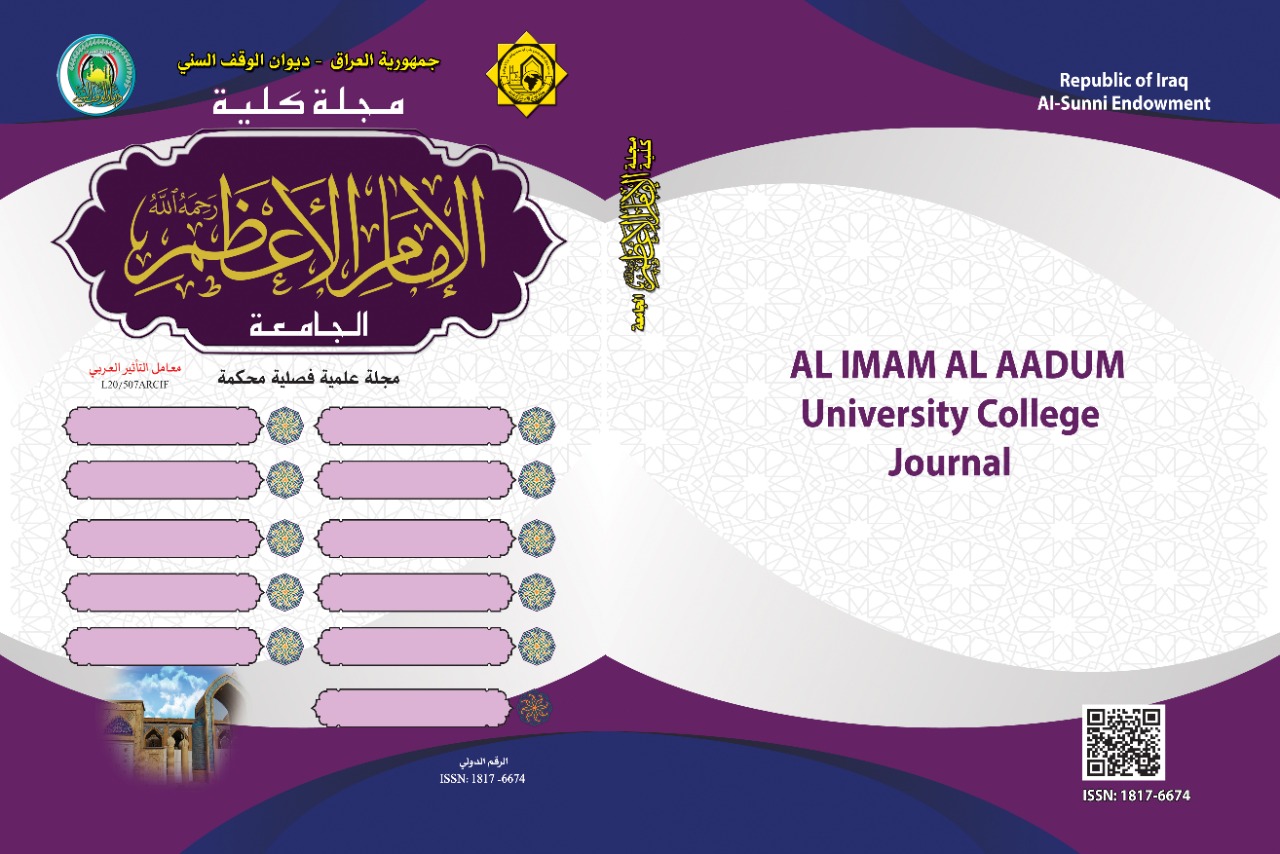Abstract
This research dealt with a common issue between the sciences of theology and the principles
of jurisprudence, (directing the obligation at the time of undertaking the act or before it) and it
was described as the most obscure in the principles of jurisprudence. Because of the confusion in
its sayings, the difference in its origin, and the vagueness in its rational inferences; Which led to a
problem in understanding these rational inferences.
The disagreement on this issue was based on two schools of thought: The first: The direction
of the obligation is before the act is initiated, but the proponents of this doctrine differed among
themselves as to whether the direction is before the act is initiated and stops before it, or whether
it continues until the act is initiated. The second: The direction of the obligation is It is when the
action is initiated, and the command before it is called notification.
The research has concluded that the saying is more likely: (The obligation is directed before
the act is initiated, and continues until the act is initiated). Because it contains a combination of
sayings, and the disagreement on this issue is verbal, and the result is the same, so the reason for
the disagreement lies in their difference in interpreting power.
of jurisprudence, (directing the obligation at the time of undertaking the act or before it) and it
was described as the most obscure in the principles of jurisprudence. Because of the confusion in
its sayings, the difference in its origin, and the vagueness in its rational inferences; Which led to a
problem in understanding these rational inferences.
The disagreement on this issue was based on two schools of thought: The first: The direction
of the obligation is before the act is initiated, but the proponents of this doctrine differed among
themselves as to whether the direction is before the act is initiated and stops before it, or whether
it continues until the act is initiated. The second: The direction of the obligation is It is when the
action is initiated, and the command before it is called notification.
The research has concluded that the saying is more likely: (The obligation is directed before
the act is initiated, and continues until the act is initiated). Because it contains a combination of
sayings, and the disagreement on this issue is verbal, and the result is the same, so the reason for
the disagreement lies in their difference in interpreting power.
Abstract
تناول هذا البحث مسألة مشتركة بين علمي الكلام وأصول الفقه، )توجه التكليف حال مباشرة الفعل
أو قبلها( ووصفت بأنها الأغمض في أصول الفقه؛ لاضطراب النقول فيها، والاختلاف في مبتناها، والغور
في استدلالاتها العقلية؛ مما أدى إلى حصول إشكال في فهم هذه الاستدلالات العقلية.
ولقد كان الخلاف في هذه المسألة على مذهبين: الأول: إن توجه التكليف يكون قبل مباشرة الفعل،
ولكن أصحاب هذا المذهب اختلفوا فيما بينهم، هل أن التوجه يكون قبل مباشرة الفعل وينقطع قبلها،
أو أنه يستمر حتى حال مباشرة الفعل، والثاني: إن توجه التكليف يكون حال مباشرة الفعل، والأمر قبله
يسمى إعلاماً.
ولقد توصل البحث إلى ترجيح القول: )توجه التكليف قبل مباشرة الفعل، واستمراره حتى مباشرة
الفعل(؛ لأن فيه جمعاً بين الأقوال، و إن الخلاف في هذه المسألة لفظي، وأن النتيجة واحدة، فسبب
الخلاف حاصل في اختلافهم في تفسير القدرة.
أو قبلها( ووصفت بأنها الأغمض في أصول الفقه؛ لاضطراب النقول فيها، والاختلاف في مبتناها، والغور
في استدلالاتها العقلية؛ مما أدى إلى حصول إشكال في فهم هذه الاستدلالات العقلية.
ولقد كان الخلاف في هذه المسألة على مذهبين: الأول: إن توجه التكليف يكون قبل مباشرة الفعل،
ولكن أصحاب هذا المذهب اختلفوا فيما بينهم، هل أن التوجه يكون قبل مباشرة الفعل وينقطع قبلها،
أو أنه يستمر حتى حال مباشرة الفعل، والثاني: إن توجه التكليف يكون حال مباشرة الفعل، والأمر قبله
يسمى إعلاماً.
ولقد توصل البحث إلى ترجيح القول: )توجه التكليف قبل مباشرة الفعل، واستمراره حتى مباشرة
الفعل(؛ لأن فيه جمعاً بين الأقوال، و إن الخلاف في هذه المسألة لفظي، وأن النتيجة واحدة، فسبب
الخلاف حاصل في اختلافهم في تفسير القدرة.
